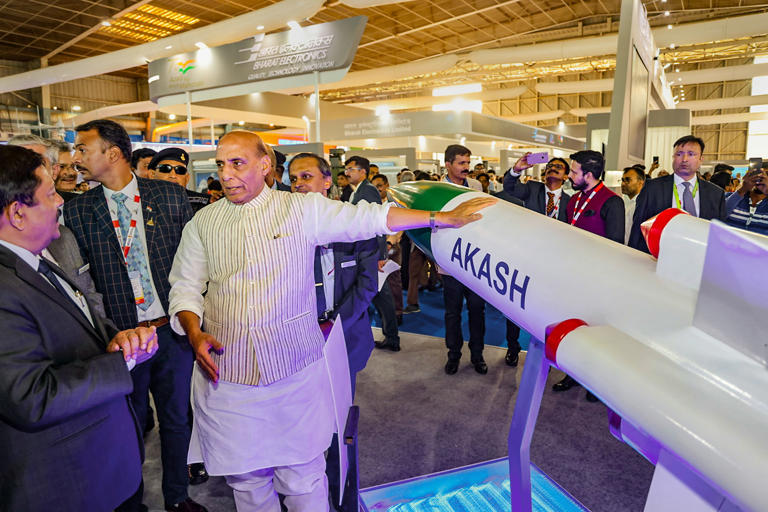Defense Minister Rajnath Singh told the top leaders of Indian and international aerospace companies on Monday that India no longer wants to be a “assembly line” for military platforms and that it now wants to make cutting-edge defence hardware.
Singh said these things at the 14th edition of Aero India, which was held at the Yelahanka Air Force station complex on the outskirts of Bengaluru. He was speaking at a “CEOs’ Roundtable.”
In his speech, the defence minister asked industry leaders to support India’s plans to become a leading manufacturer of key military platforms and equipment using critical technologies. This is in line with the country’s policy of becoming self-sufficient in defence production.
About 70 top executives from different companies were there.
Singh told the business leaders that the government would help them in any way they needed to do business in India. He said that the relationship between the government and business is based on equality and mutual trust.
He said that indigenization is the mantra for modern India, which is different from the past when imports were the norm. He also said that the government would do everything it could to get rid of “obstacles” and make things easier for businesses.
Prime Minister Narendra Modi kicked off Aero India, which runs for five days and is thought to be Asia’s biggest aerospace event, earlier in the day.
In his speech, Modi said that India has improved its defence production over the past eight or nine years and will now move quickly to join the world’s biggest defense-producing countries, thanks to good economic policies.
At the roundtable, Singh said that India doesn’t want to be just a “assembly workshop” and wants to work with friendly countries on defence and security by sharing knowledge and skills. This is in line with the prime minister’s “Make in India, Make for the World” vision.
He told the business leaders that the government is open to new ideas and wants to use the energy, entrepreneurial spirit, and skills of private sector partners in the defence field to the fullest.
The defence ministry said that many foreign original equipment manufacturers, such as Safran, Boeing, Collins Aerospace, Pratt & Whitney, and Thales, made announcements about their plans to work together and invest in India’s defence and aerospace sector.
It said that General Atomics and Bharat Forge had decided to work together even more on aircraft parts and components.
The ministry said that Hensoldt also announced the design, transfer of technology, and IPR transfer of an obstacle avoidance system for Indian helicopters, as well as the co-development of advanced multi-sensor electro-optics airborne gimbals for the Indian and world markets.
Singh said that the government was committed to building a strong, world-class defence manufacturing industry, which he called a key driver of the Indian economy.
He listed a number of important changes that the Ministry of Defense had made to make the country more business-friendly.
These include building defence corridors in Uttar Pradesh and Tamil Nadu, making it easier for businesses to get licences, raising the limit on foreign direct investment in defence, giving the private sector access to government testing and trial facilities, and increasing the amount of money spent on defence in the Union Budget 2023–24.
Singh also talked about the “Technology Development Fund” and “Innovations for Defence Excellence” programmes that were started to encourage research and development.
He said that these changes would make it possible for Indian defence products to compete with those made by well-known defence and aerospace companies around the world.
Singh liked that more private companies were getting involved in defence production and that they were getting more excited about it. He said he was confident that the roundtable would plant the seeds for successful new ventures and partnerships, increase investment, grow manufacturing in India, and strengthen the aerospace and defence ecosystem in India.
“Sky is not the limit: opportunities beyond boundaries” was the theme of the “CEOs’ Roundtable.”
Boeing, Lockheed Martin, Israel Aerospace Industries, General Atomics, Liebherr Group, Raytheon Technologies, Safran, General Authority of Military Industries, Hindustan Aeronautics Limited, Bharat Electronics Limited, Bharat Dynamics Limited, BEML Limited, Mishra Dhatu Nigam Limited, Larsen & Toubro, Bharat Forge, Dynamatic Technologies, and BrahMos Aerospace were among the companies that took part.
During the meeting, the defence ministry said, the government and industry partners talked in depth about how to improve the “Make in India” campaign.
It said that the goal was to make it easier for companies to do business in India and to give OEMs a good place to make products in the country.
Chief of Defence Staff General Anil Chauhan, Chief of Air Staff Air Chief Marshal VR Chaudhari, Chief of Naval Staff Admiral R Hari Kumar, Chief of Army Staff General Manoj Pande, and Defence Secretary Giridhar Aramane were all at the roundtable.
Officials say that around 250 business-to-business agreements are likely to be made at Aero India. These agreements are expected to lead to investments worth around Rs 75,000 crore.
They said that Aero India would promote the export of Indian air platforms like the Tejas light combat aircraft, the HTT-40, the Dornier light utility helicopter, the light combat helicopter, and the advanced light helicopter.
A lot of Indian Air Force planes showed off their flying skills in an air show at the event.
Aero India’s theme is “the runway to a billion opportunities,” and the goal of the event is to show how India has grown and improved in the defence and aerospace sectors.
In line with the government’s “Make in India, Make for the World” vision, the main goal of the event is to show off Indian equipment and technologies and form partnerships with foreign companies.
